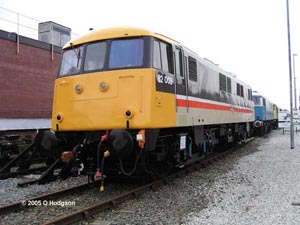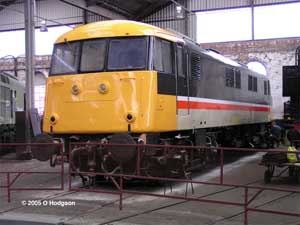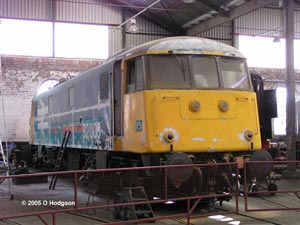| Electrical Equipment: | Associated Electrical Industries (Metropolitan Vickers) |
| Mechanical Construction: | Beyer-Peacock |
| Built: | 1961 |
|
|
82008 comes from the world-famous Beyer-Peacock locomotive works in Gorton, Manchester. It's the only one of the five early designs to be constructed with an aluminium body. Regarded as one of the best riding locomotives of the early designs, it survived only because of use on empty stock duties at Euston. It was originally preserved in 1992, but passed to the Group in 1997. 82008 was repainted into InterCity Executive livery in August 2005, and has received minor electrical restoration at Barrow Hill. Some electrical equipment has already been returned to working order (including the cooling fans).
|
|
The Metropolitan Vickers division of AEI received the second order of new AC electric locomotives for the West Coast Main Line electrification, and the result was this class of ten type AL2 locomotives. With mechanical construction subcontracted to Beyer-Peacock Ltd, Gorton, Manchester, the first loco to be delivered was E3046 which entered traffic at Longsight on 16 July 1960. Built with separate underframe and body, rather than the integral or semi-integral construction of the other types, these were the heaviest, but also nominally the most powerful of the five designs. They shared a good deal of equipment with type AL1, not surprising as both shared the same parent company (AEI). The last locomotive, E3055, was delivered in April 1962. This loco had a short, if not interesting, career. As built, it was the only one of the initial 100 locomotives not to carry two Stone-Faiveley pantographs, instead carrying one Faiveley and one AEI "cross-arm" pantograph as a trial (this type was later used on Class 87 and some Class 86). It was written off by fire in 1969 after sparks ignited the oil lubrication of the brake system and was stored for some time pending possible conversion to a prototype Thyristor / Silicon Recifier test loco in association with AEI. The other AL2 to be written off before renumbering to the TOPS system was class pioneer, E3046, which suffered a Traction Motor power control failure, believed to be the cause of a fire which gutted the rest of the loco.
During refurbishment in the early 1970s, the appearance of the Class was altered, with a revised louvre arrangement on the equipment side, necessitated by the replacement of the Mercury-Arc rectifiers with a Silicon semi-conductor type. Later physical alterations were confined to the plating over of the headcode panel and fitting of marker lights.
The class was allocated to Longsight (9A, later LG) from new until its mass-withdrawal in 1983, except for a period allocated to the general AC Lines code. Despite being the most powerful of the five types, and despite a reputation amongst drivers of having the best ride quality of the early ACs, the fact that the class was only eight strong meant that by 1983 it was non-standard, and was withdrawn together with the thirteen remaining Class 83s. A short time later, two were reinstated (nos. 82005 and 82008) and moved to Willesden depot for empty carriage (e.c.s.) duties at London Euston station. A third (82003) was retained for spare parts, while the other five made last journeys to Vic Berry's scrapyard. The e.c.s. locos had their maximum speed reduced to 40 mph, and remained at Willesden until 1987 when they were withdrawn for the last time.
The three survivors were returned north to Crewe where they became some of the first members of Crewe Electric Depot's "graveyard" of AC electrics. They remained there until 1993, when 82008 was purchased by Pete Waterman, the other two going for scrap at Booths, Rotherham.
|
|
Last-but-one of the AL2s to be built, E3054 as it was then, was received into traffic in November 1961 (strangely before previously built E3053), allocated to Longsight. Typical of most AC locos, E3054 led an unremarkable main-line career, punctuated by refurbishment, repainting from Electric Blue to Rail Blue and renumbering as 82008. Withdrawn with the rest of the class in July 1983, 82008 was subsequently reinstated and moved to Willeden for empty carriage (ECS) duties at Euston. Celebrity status came in 1985 when it was repainted into InterCity Executive livery so as to match the carriages it was hauling. Its Stone-Faiveley pantograph was replaced by a "cross-arm" type during this time (somewhat reminiscent of the early trials with classmate E3055), which it still carries.
With decreasing work and the coming availability of Class 81s, 82008 was withdrawn from ECS duties in December 1987.
Following purchase by Pete Waterman in 1993, the loco received a quick repaint back into Rail Blue in time for display at Crewe Railfair in 1994, but otherwise no attention was given to it.
|
|
Purchased by the AC Locomotive Group in 1997, the loco was moved to Barrow Hill on 5th December 1998. It was repainted "temporarily" into Large Logo Blue livery in time for Barrow Hill's 1999 Easter Open Weekend, however the livery remained until the summer of 2005 as other priorities came and went! The loco is now in InterCity Executive colours, as carried during its time as an ECS loco.
In early 2000 a start was made on re-enlivening the electrical circuits, with the batteries and lighting circuits going live in March. By September, the cooling fans had been restored to operation, powered by a fixed supply to the Barrow Hill mains. Attention has also been given to the air-brakes, with the system being recertified in 2005.
The motor generator set was restarted in April 2001 using a Generator Car as a power supply, and subsequently all five fans have been run up using this power supply. A missing auxiliary transformer currently prevents the rectifier fans from being added to the chorus, but the overall effect is still impressive.
The loco attended the Crewe Electric Depot staff open day in November 2001, but its first public appearance away from Barrow Hill since purchase by the group was at the Crewe Works Open Days in September 2005.
A full, long-term, overhaul of the electrical equipment is planned.
GENERAL INFORMATION
| Original Number | E3054 |
| BR TOPS Number | 82008 |
| Network Rail TOPS Number | 82008 / 89554 |
| Number Carried | 82008 |
| Current Livery | InterCity Executive |
GENERAL DETAILS - CLASS 82
| Type / Class | AL2 / 82 |
| Original BR 1957 Number Series | E3046-E3055 |
| BR TOPS Original Number Series | 82001-82008 |
| Introduced | 1960-1962 |
CONSTRUCTION DETAILS
| Builder | Beyer Peacock & Company, Gorton, Manchester |
| Electrical Equipment Manufacturer | Associated Electrical Industries (Metropolitan Vickers) |
| Works Number Series | 1021/7884-1030/7893 |
PRINCIPAL DIMENSIONS
| Weight In Working Order | 78.4 tons |
| Length Over Buffers | 56' |
| Width | 8' 9" |
| Height Over Body | 12' 4 1/4" |
| Height Over Pantograph (lowered) | 13' 0 9/16" |
| Wheelbase | 40' 9" |
| Bogie Wheelbase | 10' |
| Bogie Pivot Centres | 30' 9" |
| Wheel Diameter | 4' |
| Minimum Curve | 4 chains |
PERFORMANCE DETAILS
| Maximum Speed | 100 mph (40 mph for Euston e.c.s. duties) |
| Horsepower (full field) | 3320 hp |
| Horsepower (weak field) | 3310 hp |
| Maximum Rail Horsepower | 5500 hp |
| Maximum Tractive Effort | 48000 lb |
| Continuous Tractive Effort | 17000 lb at 73 mph |
| Brake Force | 38 tons |
| Electric Train Heating Index | 66 |
EQUIPMENT DETAILS
| Transformer and Control Gear | Oil cooled, High Tension Tap Changing |
| Rectifier Type | Mercury Arc multi anode air cooled Later replaced by Silicon rectifiers |
| Voltage Detection Equipment (never used) | Potential transformer |
| Bogie Type | Cast steel, swing link suspension |
| Circuit Breaker Type | AEI Air Blast Circuit Breaker |
| Traction Motor Type | AEI (BTH) 189Z 6-pole (847 hp) |
| Traction Motor Drive | Alsthom Quill |
| Gear Ratios | 29/76 |
| Pantograph Type | 2 x Stone-Faiveley (one later removed), E3055 1 x Stone Faiveley + 1 x AEI "cross-arm", later 82008 had 1 x AEI "cross-arm" |
| Locomotive Brake Type | Air |
| Train Brake Type | Vacuum, later Vacuum and Air |
| 1st E No. (1959) | 2nd E No. (1960) | 1st TOPS No. | 2nd TOPS No. | Depart-mental No. | Network Rail '89' No. | Last No. | Builder | Intro | Status | Notes | Names | 1965 Proposed Names |
|---|---|---|---|---|---|---|---|---|---|---|---|---|
| E3046 | E3046 | AEI (MV) / Beyer Peacock | May-60 | Scrapped 1971: BREL Crewe | Eros | |||||||
| E3047 | 82001 | 82001 | AEI (MV) / Beyer Peacock | Jul-60 | Scrapped 1985: Vic Berry Leicester | Kensal Green Crash (1977) | Explorer | |||||
| E3048 | 82002 | 82002 | AEI (MV) / Beyer Peacock | Aug-60 | Scrapped 1984: Vic Berry Leicester | |||||||
| E3049 | 82003 | 82003 | AEI (MV) / Beyer Peacock | Aug-60 | Scrapped 1993: CF Booth Rotherham | |||||||
| E3050 | 82004 | 82004 | AEI (MV) / Beyer Peacock | Sep-60 | Scrapped 1984: Vic Berry Leicester | |||||||
| E3051 | 82005 | 82005 | AEI (MV) / Beyer Peacock | Oct-60 | Scrapped 1993: CF Booth Rotherham | |||||||
| E3052 | 82006 | 82006 | AEI (MV) / Beyer Peacock | Dec-60 | Scrapped 1984: Vic Berry Leicester | |||||||
| E3053 | 82007 | 82007 | AEI (MV) / Beyer Peacock | Jan-62 | Scrapped 1984: Vic Berry Leicester | |||||||
| E3054 | 82008 | 89554 | 82008 | AEI (MV) / Beyer Peacock | Nov-61 | Preserved 1997: The AC Locomotive Group | Originally preserved by Pete Waterman. Railtrack '89' number allocated but never used. | |||||
| E3055 | E3055 | AEI (MV) / Beyer Peacock | Apr-62 | Scrapped 1970: BREL Crewe | Carried one AEI 'Cross Arm' pantograph and one Stone Faiveley pantograph when new. After withdrawal (due to fire damage) was proposed for conversion to a thyristor prototype. |
 82008 at Crewe Works in 2005
82008 at Crewe Works in 2005  82008 at Barrow Hill
82008 at Barrow Hill 82008 at Barrow Hill
82008 at Barrow Hill